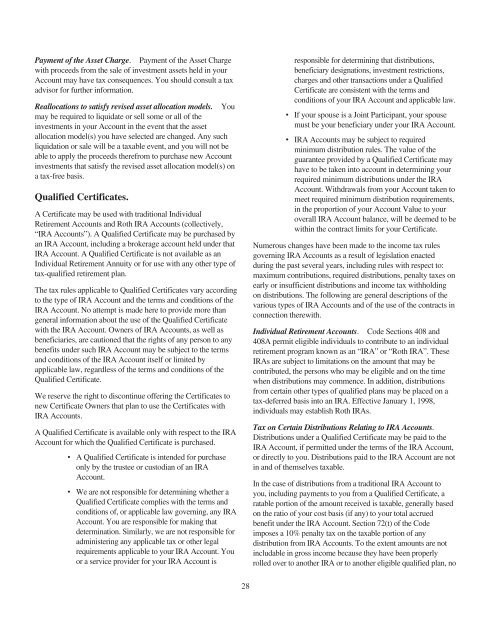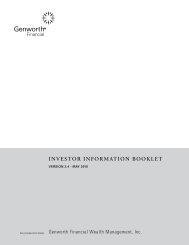Issued by Genworth Life and Annuity Insurance Company
Issued by Genworth Life and Annuity Insurance Company
Issued by Genworth Life and Annuity Insurance Company
You also want an ePaper? Increase the reach of your titles
YUMPU automatically turns print PDFs into web optimized ePapers that Google loves.
Payment of the Asset Charge. Payment of the Asset Charge<br />
with proceeds from the sale of investment assets held in your<br />
Account may have tax consequences. You should consult a tax<br />
advisor for further information.<br />
Reallocations to satisfy revised asset allocation models. You<br />
may be required to liquidate or sell some or all of the<br />
investments in your Account in the event that the asset<br />
allocation model(s) you have selected are changed. Any such<br />
liquidation or sale will be a taxable event, <strong>and</strong> you will not be<br />
able to apply the proceeds therefrom to purchase new Account<br />
investments that satisfy the revised asset allocation model(s) on<br />
a tax-free basis.<br />
Qualified Certificates.<br />
A Certificate may be used with traditional Individual<br />
Retirement Accounts <strong>and</strong> Roth IRA Accounts (collectively,<br />
“IRA Accounts”). A Qualified Certificate may be purchased <strong>by</strong><br />
an IRA Account, including a brokerage account held under that<br />
IRA Account. A Qualified Certificate is not available as an<br />
Individual Retirement <strong>Annuity</strong> or for use with any other type of<br />
tax-qualified retirement plan.<br />
The tax rules applicable to Qualified Certificates vary according<br />
to the type of IRA Account <strong>and</strong> the terms <strong>and</strong> conditions of the<br />
IRA Account. No attempt is made here to provide more than<br />
general information about the use of the Qualified Certificate<br />
with the IRA Account. Owners of IRA Accounts, as well as<br />
beneficiaries, are cautioned that the rights of any person to any<br />
benefits under such IRA Account may be subject to the terms<br />
<strong>and</strong> conditions of the IRA Account itself or limited <strong>by</strong><br />
applicable law, regardless of the terms <strong>and</strong> conditions of the<br />
Qualified Certificate.<br />
We reserve the right to discontinue offering the Certificates to<br />
new Certificate Owners that plan to use the Certificates with<br />
IRA Accounts.<br />
A Qualified Certificate is available only with respect to the IRA<br />
Account for which the Qualified Certificate is purchased.<br />
‰ A Qualified Certificate is intended for purchase<br />
only <strong>by</strong> the trustee or custodian of an IRA<br />
Account.<br />
‰ We are not responsible for determining whether a<br />
Qualified Certificate complies with the terms <strong>and</strong><br />
conditions of, or applicable law governing, any IRA<br />
Account. You are responsible for making that<br />
determination. Similarly, we are not responsible for<br />
administering any applicable tax or other legal<br />
requirements applicable to your IRA Account. You<br />
or a service provider for your IRA Account is<br />
responsible for determining that distributions,<br />
beneficiary designations, investment restrictions,<br />
charges <strong>and</strong> other transactions under a Qualified<br />
Certificate are consistent with the terms <strong>and</strong><br />
conditions of your IRA Account <strong>and</strong> applicable law.<br />
‰ If your spouse is a Joint Participant, your spouse<br />
must be your beneficiary under your IRA Account.<br />
‰ IRA Accounts may be subject to required<br />
minimum distribution rules. The value of the<br />
guarantee provided <strong>by</strong> a Qualified Certificate may<br />
have to be taken into account in determining your<br />
required minimum distributions under the IRA<br />
Account. Withdrawals from your Account taken to<br />
meet required minimum distribution requirements,<br />
in the proportion of your Account Value to your<br />
overall IRA Account balance, will be deemed to be<br />
within the contract limits for your Certificate.<br />
Numerous changes have been made to the income tax rules<br />
governing IRA Accounts as a result of legislation enacted<br />
during the past several years, including rules with respect to:<br />
maximum contributions, required distributions, penalty taxes on<br />
early or insufficient distributions <strong>and</strong> income tax withholding<br />
on distributions. The following are general descriptions of the<br />
various types of IRA Accounts <strong>and</strong> of the use of the contracts in<br />
connection therewith.<br />
Individual Retirement Accounts. Code Sections 408 <strong>and</strong><br />
408A permit eligible individuals to contribute to an individual<br />
retirement program known as an “IRA” or “Roth IRA”. These<br />
IRAs are subject to limitations on the amount that may be<br />
contributed, the persons who may be eligible <strong>and</strong> on the time<br />
when distributions may commence. In addition, distributions<br />
from certain other types of qualified plans may be placed on a<br />
tax-deferred basis into an IRA. Effective January 1, 1998,<br />
individuals may establish Roth IRAs.<br />
Tax on Certain Distributions Relating to IRA Accounts.<br />
Distributions under a Qualified Certificate may be paid to the<br />
IRA Account, if permitted under the terms of the IRA Account,<br />
or directly to you. Distributions paid to the IRA Account are not<br />
in <strong>and</strong> of themselves taxable.<br />
In the case of distributions from a traditional IRA Account to<br />
you, including payments to you from a Qualified Certificate, a<br />
ratable portion of the amount received is taxable, generally based<br />
on the ratio of your cost basis (if any) to your total accrued<br />
benefit under the IRA Account. Section 72(t) of the Code<br />
imposes a 10% penalty tax on the taxable portion of any<br />
distribution from IRA Accounts. To the extent amounts are not<br />
includable in gross income because they have been properly<br />
rolled over to another IRA or to another eligible qualified plan, no<br />
28








